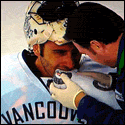|
Mods, please change title of thread to Fiction Writing: JUST loving WRITE
|
|
|
|

|
| # ? May 15, 2024 17:47 |
|
Walamor posted:http://writeordie.com/#Web+App
|
|
|
|
Martello posted:Mods, please change title of thread to Fiction Writing: JUST loving WRITE And then change the title of the self-pub erotica thread to Erotica Writing: JUST WRITE loving
|
|
|
|
Blade_of_tyshalle posted:And then change the title of the self-pub erotica thread to Erotica Writing: JUST WRITE loving I thought mods killed that thread???
|
|
|
|
There are lots of different techniques for plotting out writing -- the Hero's Journey, the Snowflake, the "Save The Cat" story beats, David Lynch's 'Come up with 60 scenes and shuffle them randomly' method, Evan Marshall's 16-Step Plan, Socratic theme, Freudian ego-driven analysis, and on and on and on. One or more will usually resonate with you, and any of them can be helpful if you put some effort in. What none of them do well is convey the first principles. I very strongly recommend reading McKee's "Story". It's the best discussion of what actually makes a plot that I've ever seen. It's aimed at movie scripts, but almost everything he says is as true of novels as it is of films.
|
|
|
|
I'm not directly responding to graphic novel guy with this post. This is for everyone. I've never read any of this author's stuff, but he sells well and gives good advice: http://jimbutcher.livejournal.com/1308.html I would check out his whole blog, but this is the piece of advice that most strongly resonated with me. I read it as the plot of my first novel fell apart and I was deciding if I should push on or give up on the novel: quote:The story skeleton (also called a story question) consists of a simple format: The advice to "JUST WRITE!" still applies and is the number one thing everyone should be doing. With that said, I spent two months "just writing" after laying down a world-building-heavy, haphazard plan with no antagonist (I shoved antagonists in eventually, but they were not planned out before I started writing), and if there is one planning thing I wish I had done before writing 35,000 words, it's the above quote. You are going to gently caress up and write total poo poo on your first attempt. You think you're special, everyone does, and that it doesn't apply to you. Surely you will be different than everyone else who has ever written a lovely first novel. You are not different and you're going to gently caress it up somehow. The "just write" advice is good because you have to gently caress up a lot before you can do something good. You can read an infinite number of blog/forum posts and "plan" forever, but until you put thousands of lovely words into your word processor, it's pointless. After you've failed at your first novel and hate yourself for it, go back and read some blog/forum posts and advice: it will benefit you after you have done something). Don't read too much or spend forever planning again, just start writing another lovely novel. Hopefully your second one won't be as terrible.
|
|
|
|
Yeah. I can't emphasize enough how much failure and sucking is important for writing. Everyone knows you gotta suck at something to get better at it but seem to forget that tidbit when it comes to writing anything. Every single thing you write will teach you something new. Not just first books or stories, but first and second drafts. Write an outline, bleed words, revise, keep going. Your first story or novel you write isn't to prove to anyone that you know what you're doing. It's to prove to yourself that you can do it. That doesn't hinge on success or even failure, but a final sense of what it takes, what process works for you, and a path forward. That's the most valuable thing you can get. If write or die doesn't work for you necessarily, try the pomodoro technique. 25 minute sessions with 5 minute breaks saved me. When you start getting into the groove, you can start estimating exactly how much you can write. This will help you move from your outline to staring at your proposed 100k novel with dumbfounded fear to digestible sessions of 500-1000 words. Your first draft won't be perfect, but you can't revise a blank page.
|
|
|
|
In addition to writing a lot I think its also important to read as much as possible, and to diversify the genre's you're reading (so if you're writing a mystery don't just read mysteries, if you're writing a romance don't just read romances, if you're writing in a flowery and descriptive style then check out authors who are terse and laconic). On that note, and in the name of practising what I preach, I've been trying to make myself spend more time on fiction. For some reason I've fallen into a habit of reading non-fiction for pleasure, so I'm much more likely to pick up a piece of journalism or history or philosophy rather than a well written yarn that might give me some insights on how to compose a good story. Then the fiction I do read tends to be very trashy guilty pleasure stuff: Lovecraft, Robert E. Howard, Stephen King, etc. So if anyone here might have recommendations on authors who they think excel at the craft of writing short fiction I'd really appreciate some recommendations. Recently I've been reading a lot of crime stories by Elmore Leonard and Ed McBain. If anybody could recommend something new for me to read (any genre is fine, but ideally not science fiction or fantasy please) based on the sole criteria that it exemplifies the art of short story writing then I'd be very appreciative.
|
|
|
|
For short stories, I really liked "Interpreter of Maladies" by Jhumpa Lahiri. Definitely some first generation American themes, but really well crafted. I should reread it.
|
|
|
|
Helsing posted:In addition to writing a lot I think its also important to read as much as possible, and to diversify the genre's you're reading (so if you're writing a mystery don't just read mysteries, if you're writing a romance don't just read romances, if you're writing in a flowery and descriptive style then check out authors who are terse and laconic). Alice Munro writes amazing short stories. Damon Runyon and O Henry do too.
|
|
|
|
Helsing posted:So if anyone here might have recommendations on authors who they think excel at the craft of writing short fiction I'd really appreciate some recommendations. Recently I've been reading a lot of crime stories by Elmore Leonard and Ed McBain. If anybody could recommend something new for me to read (any genre is fine, but ideally not science fiction or fantasy please) based on the sole criteria that it exemplifies the art of short story writing then I'd be very appreciative. I've been reading Junot Diaz and his skill at the craft of short fiction has been stupefying. Also an author I think is about to be reprinted is Tom Cho's "Look Who's Morphing", which is one of the most original and modern short story collections I've ever read.
|
|
|
|
Helsing posted:So if anyone here might have recommendations on authors who they think excel at the craft of writing short fiction I'd really appreciate some recommendations. Recently I've been reading a lot of crime stories by Elmore Leonard and Ed McBain. If anybody could recommend something new for me to read (any genre is fine, but ideally not science fiction or fantasy please) based on the sole criteria that it exemplifies the art of short story writing then I'd be very appreciative. Sci fi / fantasy may be less than ideal, but I highly recommend Octavia Butler's collection including "Bloodchild," plus cred for one of the earliest black female sci fi authors.
|
|
|
|
systran posted:I'm not directly responding to graphic novel guy with this post. This is for everyone. https://www.youtube.com/watch?v=oiKmP-tL4vo https://www.youtube.com/watch?v=nQWDZp05leA Butcher has some pretty solid advice here that he also covers in livejournal posts to varying degrees. He focuses primarily on structure and characterization as opposed to surface prose details like the beauty of language, and I found it very valuable in recent appraisals of my own work, which was technically okay but way too unfocused plot and character-wise.
|
|
|
|
So on Kloctopussy's advice, here I am. I get why I lost Thunderdome, so I'm not going to bitch about that. It was a halfassed entry where I gave up and said "I'm just going to do something stupid." I don't really want to get into writing comedy hardcore, because I know and understand that it's one of the hardest things to write. But let's throw this out there anyway: how do you write comedy? Also I'm not sure how to get onto the TD IRC. Also also thanks for the livejournal link, systran. I've read a lot of Butcher's Dresden Files books and he's really good.
|
|
|
|
I use chrome and the mibbit web application. On mibbit you press "channels" and then enter the server as "irc.synirc.net". For the channel, enter "#kyrena". I am not going to even keep up appearances anymore; NO ONE uses #thunderdome because of the elephant in the room. A lot of people are usually in #kyrena chatting, so if you post on TD and want to talk about writing stuff, please feel free to join!
|
|
|
|
never mind
Martello fucked around with this message at 20:29 on Oct 11, 2013 |
|
|
|
I use hexchat, is that the same thing? Might want to update or get rid of the irc thing on the first page of thunderdome, then.
|
|
|
|
Who the hell takes writing advice from loving Jim Butcher? That's just bizarre. I guess he has sold a lot of books, but still. I guess if you want to write lovely Hellblazer fanfiction he's your man?
|
|
|
|
And while we're at it who takes writing advice from the loving internet I guess people've sold a lot of centaur erotica, but still. If you want to write RAVAGEd BY THE CENTAUR EMPEROR (reluctant gay), we're your dudes.
|
|
|
|
ravenkult posted:Who the hell takes writing advice from loving Jim Butcher? That's just bizarre. Yeah man, I hear ya, who would ever want advice from a successful author with a large fan base.
|
|
|
|
CantDecideOnAName posted:I don't really want to get into writing comedy hardcore, because I know and understand that it's one of the hardest things to write. But let's throw this out there anyway: how do you write comedy? First off, "I don't want to X, because it's hard" is a bad attitude to have. If you like something and you want to try it, go for it. Don't shrink away just because it's not easy. You can start off by reading successful humor writers. I grew up on Dave Barry's books. You can probably find a few of his older paperbacks in the bargain bin by now. Comedy is hard because it's wildly variable. You're usually playing off of concepts and cultural tropes that people may not be familiar with. The "bro" stories we sometimes get in the dome are usually well-received here, because we're (mostly) young(-ish) and familiar with the cultural tropes associated with that subculture, so riffing off of it works. You can get away with humor based on internet culture here, because we're obviously all familiar with it. For other audiences, your reception will vary. Anyway. The absolute core of comedy is to set up an expectation, then violate the expectation in an unusual way, preferably one that forces the reader to re-examine their assumptions. One reason your piece last week fell down was that the joke was obvious: "we're out of virgins - well, except for internet nerds." That's a punchline that's become tired and predictable because it has been thrown around internet culture for so long. Because it's a familiar joke, the setup ("we're out of virgins") immediately makes me expect you to go for an internet-nerd joke. Since you then deliver exactly what I expected, it's a lame joke, and you've done nothing new with it. I noted a possible funnier take in my crit. "We're out of virgins", "oh, that's too bad. I never did get why the Dark Gods needed so much olive oil though." 'Virgins' and 'Dark Gods' sets up an expectation of human sacrifice, and the punchline violates it. Bam, job done. Further, it forces you to re-examine the word Virgin and see the pun. Bonus humor! Another classic way to construct a joke is to set up expectations by presenting two similar things, and finish the list with a non-sequitur. "Did you get everything we need for tonight?" "Well, I got the carrots and celery, but they were all out of virgins." You can improve it by reinforcing the assumption after the third item. "Vegas is so glamorous. The lights, the show, the passing-out-in-your-own-vomit-at-five-AM. What a place to see and be seen!" You can do this at a sentence level, at a paragraph level or longer. That's called layering gags, and it's really hard to do well, but very satisfying. Running gags are also good. Once you've found something absurd or funny, repeat it later on in (in)appropriate places as a punchline with a different setup. Once you get a few of these in, the reader starts looking for places where you might set up the running gag - an expectation, which you can then fulfill or violate as the story demands. Read some of Robert Rankin's stuff, he's great at this. For jokes in English, you can also mess with phonemes. For some reason, we culturally find "g" and hard "k" sounds funnier. Starting and ending a word with a plosive is usually amusing. Don't ask me why. This is actually where the name "Duke Guncock" came from - I was trying to shove as many G/K sounds into a name as possible, while stringing together words that were stereotypically "masculine".
|
|
|
|
ravenkult posted:Who the hell takes writing advice from loving Jim Butcher? That's just bizarre. Fortunately, some people are able to distill successful concepts and apply them to any type of fiction they like! Unfortunately, a lot of renowned and very successful authors are incredibly lovely at examining their process and teaching it to others. You see the same thing with other experts, like top athletes who make lovely coaches, et cetera, because sometimes people who are uniquely gifted either forgot how they became that way or they don't understand why other people just can't do what they do naturally, so they can't explain things well to beginners. Jim Butcher is one of a handful of people who seem to be able to communicate his process, probably because he had to work a long time to build his career and was able to identify techniques before internalizing them. CantDecideOnAName posted:I don't really want to get into writing comedy hardcore, because I know and understand that it's one of the hardest things to write. But let's throw this out there anyway: how do you write comedy?
|
|
|
|
Walamor posted:Yeah man, I hear ya, who would ever want advice from a successful author with a large fan base.
|
|
|
|
Mad Revolt posted:Success and popularity do not mean that an author is a good writer. Kafka was barely known until after he died. EL James made enough money off a twilight fanfic to buy a small country I don't know how this relates to my point. Butcher is offering writing advice. People who are interested in writing books similar to Butcher writes would probably be interested in such advice because he has done very well. Or maybe just people in general who want another perspective on writing from a successful author.
|
|
|
|
I only take advice from South African widows that have only written short stories for elementary school projects and half-read required school books.
|
|
|
|
I love Jim Butcher's Livejournal advice (it's one of the few writing advice pieces I have bookmarked) because it's deceptively simple yet surprisingly rich in application and I really should remember to apply it more often. OTOH What's interesting is that a lot of criticism you can level against Butcher's writing has its seeds in the approach he lays out in those pieces - namely a lot of his books hew too closely to an episodic formula, to the point when you can successfully predict when the next dramatic piece of bad luck will befall his protagonist to within a couple of pages. But you can't fault a guy for showing you where he keeps his hammer and nails. If you don't like the house he builds, fix his design mistakes you build your own one.
|
|
|
|
His entire livejournal is actually just a giant manual on how to pre-plan a novel. It took several readings of it for me to actually notice this; I'm currently following the process to plan my second novel attempt (my first novel suffered from poor plot planning). I have never read any of his writing, but I can look at writing advice and know when it's good. I think a large amount of his advice, especially the importance of conflict, is worth following. I am a new writer and I am willing to spend several months trying to follow his advice by planning a novel using his method and then writing it. If it works better than my previous attempt I will likely keep a lot of elements of his planning structure for my next attempt. I can see some of the issues Fumblemouse is mentioning: Writing "tags and traits" for all of my characters and then using them when those characters are mentioned feels somewhat ridiculous, but I'm willing to give it a shot and see how it works for my reading group. My first novel suffered from some characters blending together and not being distinguishable, so I have very little to lose.
|
|
|
|
Thanks to everyone who gave me advice on short story authors. I grabbed some books by Alice Munroe today since the rest of my family all love her and were able to loan me books, but I made a list of all the suggestions in this thread and will be trying to check out all of them over the next couple months. I definitely need something to work with because if anything my thunderdome entries are getting worse over time, and the worse they get the less enthusiastic I am, which cuts into the time I'm spending editing them. I'm making myself enrol every week but increasingly I find myself waiting until Sunday morning to even start writing anything, with fairly predictable results. Maybe that's a sign that I should focus more on writing long form fiction but the enforced due dates and guaranteed feedback you get from thunderdome provides a motivational framework that is hard to reproduce when you're writing on your own and also have various life and work commitments sapping away your free time.
|
|
|
|
My guide to not losing Thunderdome (and MAYBE winning?): 1) Do not enter unless you plan to start working on your story immediately after entering. There is no reason to sign up and not work on your entry. You have until Friday to sign up! If you do wait until Friday to sign up, you better plan to allocate an appropriate amount of time over the three days that you have to make up for the late sign up. Ideally you want to enter the same day the prompt comes up, and have a rough draft done that first day. You then check your story once every day and make revisions. You can't really proofread something you just wrote. If you proofread the next day, things will immediately jump out at you as bad. If you sign up early and polish every day, you maximize the number of things you can spot and fix. I would guess 85% of the people who enter are not going to follow this timeline or do more than one re-read. If you do, you gain a significant advantage and drastically minimize your chance of losing. Example from this week: 90's Kids. If this author had let the draft sit a day, then re-read it the next day, he/she would have realized it was unclear and confusing, and ideally would have had several days to fix it from there. 2) Make the story sound good in your head before you start writing. The beauty of flash fiction is that you can create every aspect of the story in your head (or on quick notes) before you write anything down. You will inevitably think of a lot of ideas that sound good at first, but then once you play the whole story out and flesh it out in your head, you will realize it falls apart. A lot of people seem to come up with the seedling of an idea, and then write the whole story out stream of consciousness. The story ends up going nowhere, not making sense, or being a "so what?" type story (look at 90's Kids or Svetlana from this week's TD entries). If these authors had conceptualized the whole thing in their heads, asking "What is the beginning, middle and end of this?" they would not have ended up with these stories. 3) The first line is incredibly important! Here are a collection of bad first lines from this week. Ask yourself is these first lines hook you and make you want to read on: quote:ďOk,Ē I asked, rubbing my temples while I waited for the ibuprofen to kick in, ďTell me once more exactly what happened in there.Ē This is so meandering. I don't know who took ibuprofen and I don't care. You are setting up this conceit of someone having told a story, and now what we are going to see is him being retold the story. I do not want to hear someone repeating themselves. I have no reason to want to keep reading from this. quote:ďMorning, Steve.Ē This opening is trying to just arbitrarily start. The author has given no thought to the best point in the story to begin. He is just starting, somewhere, and has no idea that starting at an interesting time is important. quote:Diesel fumes roused Bailey to consciousness, he thought he was still on the helipad. This author is trying to make an interesting opening, it just doesn't work. People waking up as the story starts is generally ineffective, and "thinking he was still on the helipad" does not make me wonder, "Woah!!! Where is he then?!?!" because I have no vested interest in this yet. I really don't want to read after this sentence. quote:Another ordinary Friday night at the local bar. This is the worst opening, even worse than "Morning, Steve". Instead of being unaware of openings being important and just starting somewhere, you are going out of your way to explicitly tell us that nothing interesting is going to happen. I actually DID stop reading here and did not read the rest of the story. quote:It was a clear evening; you could see the sun. This is trying to "set the scene," but there could be a number of interesting things happening. Even if you are describing a giant storm, it's not interesting, so a clear evening where the sun is out is orders of magnitude less interesting. These openings all suck. I read these and want to stop reading right away. If you open like this, you are starting in a hole and have to fight your way back out, but since you only have 666 words, you end up spending the first 1/3 of your story recovering from your terrible opening. Here are the good openings from this week: quote:(interesting rap followed by...) ďThank you for your hip-hop,Ē said the girl behind the Huawei-Starbucks counter. ďYou may purchase anything up to a straight black.Ē This one makes me want to know how hip hop as a currency will work, I genuinely want to read the next line because I'm interested in the story. Rhino kind of let me down with the story itself, but I still love the opening and have an overall favorable impression of this submission. quote:A cable snapped - the stunt coordinator still doesnít know exactly what went wrong - and the wire rigs whipped two tweenage Broadway stars across the set of Children on Leashes: The Musical. I THINK there is a tense shift in here, which sucks, but there is enough going on in this opening that I want to read on. Explaining the logistics of such a ridiculous musical (and that something went wrong with those logistics) works for me and makes me want to know more about this weird premise. To be fair, the prompt GAVE HIM/HER this premise, but he/she at least was smart enough to put that into the opening line! This author flubbed the middle and stuck the ending, so I came away with a favorable impression even though the middle of the story was kind of boring. quote:ďWhat the gently caress?Ē said the embryo. This is a good opening because embryos can't speak. A talking embryo is inherently interesting, and even if the author completely fucks up every element after this sentence, at least his opening is good. Luckily the story itself is engaging, so we are left with an overall favorable impression. angel opportunity fucked around with this message at 21:54 on Oct 14, 2013 |
|
|
|
systran posted:
I focused this time around on trying to write a strong opening due to your advice on the last page. Now I need to follow your timeline guide since I probably could have fixed a lot of the failings if I were more diligent in drafting.
|
|
|
|
Jagermonster posted:I focused this time around on trying to write a strong opening due to your advice on the last page. Now I need to follow your timeline guide since I probably could have fixed a lot of the failings if I were more diligent in drafting. For what it's worth, I liked your story the most, but I also liked Fumblemouse. The other two judges liked Fumblemouse's better than yours so I gave it the win, but yeah, with a few more edits you probably could have won.
|
|
|
|
systran posted:I THINK there is a tense shift in here, which sucks, but there is enough going on in this opening that I want to read on. Explaining the logistics of such a ridiculous musical (and that something went wrong with those logistics) works for me and makes me want to know more about this weird premise. To be fair, the prompt GAVE HIM/HER this premise, but he/she at least was smart enough to put that into the opening line! This author flubbed the middle and stuck the ending, so I came away with a favorable impression even though the middle of the story was kind of boring.
|
|
|
|
Erogenous Beef, from last week's TD posted:
Okay, I want to be certain about what you've said cause it's potentially a big comment. When you say "too clever," do you mean that the format is getting in the way of the meaning? It's funny that you suggest rewriting it 'normally', because that's the way I originally started to write it, and it just seemed really domestic and flat. The way I eventually submitted it satisfied me because it felt the most immediate way of conveying a character, giving him the most airtime. I didn't care what the woman was like, and neither does he. Personally, I feel uneasy about the current flood of present-tense prose, but I accept that there's some stuff it does really well... so I guess my question is: would this format have repelled you however it was written?
|
|
|
|
Symptomless Coma posted:Okay, I want to be certain about what you've said cause it's potentially a big comment. When you say "too clever," do you mean that the format is getting in the way of the meaning? It's funny that you suggest rewriting it 'normally', because that's the way I originally started to write it, and it just seemed really domestic and flat. The way I eventually submitted it satisfied me because it felt the most immediate way of conveying a character, giving him the most airtime. I didn't care what the woman was like, and neither does he. Largely, I felt the monologue style obscured whatever meaning or development you were trying to portray. It worked okay as a character-study of a type-A guy with some subtle hypocrisy. If you were just going for that, I'd say "competent, but unsatisfying". We're shown a guy. He's a douche. Okay. And? There's no character development - hard in 600 words, I know, but other pieces done in a more-conventional style managed it. I'm not a huge fan of present-tense prose myself, but I suppose yes, no matter what, the monologue style is going to predispose me to not liking your piece unless there's some absolutely masterful writing in there.
|
|
|
|
This makes a whole lotta sense, thanks.
|
|
|
|
Today I finished this thread and my first short story in my adult life. It still needs a lot of editing, but I did it.
|
|
|
|
blue squares posted:Today I finished this thread and my first short story in my adult life. It still needs a lot of editing, but I did it. Congrats! Stick with it, your stories will only improve with time if you put the work in
|
|
|
|
blue squares posted:Today I finished this thread and my first short story in my adult life. It still needs a lot of editing, but I did it. Post it. I will give you a line edit crit, since I am procrastinating on another thing.
|
|
|
|
sebmojo posted:Post it. I will give you a line edit crit, since I am procrastinating on another thing. My plan is to let it sit for a few days and then do that myself. I'll throw it up after the second or third draft. I really appreciate the offer, but it's definitely not ready for anyone to read it yet.
|
|
|
|

|
| # ? May 15, 2024 17:47 |
|
This is by a game developer, Raph Koster, but it works pretty well for fiction:quote:Everyone who dislikes your work is right. (not a response to the person above, btw, I just found it and thought it was useful)
|
|
|































